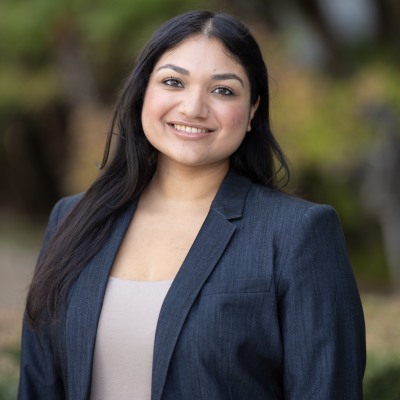 1580 N. Northwest Highway, Suite 12, Park Ridge, IL 60068
1580 N. Northwest Highway, Suite 12, Park Ridge, IL 60068
Fall 2025 Winner of the Justice in Family Law Scholarship
Samia Noor

Samia believes that the available resources for self-represented litigants in family law cases are severely lacking. To ensure that these individuals have proper access to pursuing justice, she explores various areas in which the legal system can improve its resources and processes. Congratulations, Samia – we cannot wait to see the positive impacts of your legal advocacy!
Read her essay
Access Denied: The Injustice Facing Self-Represented Litigants in Family Law
Each year, thousands of aspiring lawyers enter law school with the goal of advocating for individuals. Yet, while these future attorneys prepare to argue cases, millions of Americans appear in family courts without legal representation. Self-represented litigants (SRLs), who comprise over 70% of parties in some family law cases, face significant procedural and substantive barriers that undermine their access to justice. This gap is not just inconvenient; it is a structural injustice that directly threatens the fair implementation and enforcement of family law.
Structural Barriers to Justice
Family law encompasses high-stakes issues such as divorce, custody, child support, and protection from abuse. Yet for SRLs, these complex processes are fraught with barriers. While resources like court self-help centers, legal aid organizations, and public law libraries exist, their reach is severely limited.
Court self-help centers provide guidance on forms and procedures but cannot offer legal advice due to unauthorized practice of law restrictions (Rhode, 2014). Many are also underfunded and understaffed. For instance, SHARP, a self-help center in Northern California, serves three counties with only 11 staff members—far too few to meet local demand. Legal aid organizations offer more robust support but often operate under strict income eligibility requirements and limited funding. The Legal Services Corporation (LSC) reports turning away 50% of eligible applicants due to lack of resources (LSC, 2022). Public law libraries, another lifeline for SRLs, are often inaccessible to non-English speakers and lack the resources for personalized guidance.
Real-World Consequences in Family Court
These barriers manifest in critical procedural failures. Many SRLs are unable to properly file proof of service or finalize judgments, leading to delays, dismissals, or unenforceable orders (Macfarlane, 2013). In family law cases, delays can exacerbate emotional stress, separate parents from children, and leave individuals unprotected from abusive partners.
For survivors of intimate partner violence (IPV), the stakes are especially high. Without representation, survivors must face their abusers in court, navigate intimidating legal processes, and endure cross-examinations that can retraumatize. The adversarial system, designed for litigants with legal knowledge, too often empowers abusers to manipulate the process and maintain control (Goodmark, 2018).
These failures are compounded for marginalized communities. Women of color and low-income individuals are disproportionately self-represented and face heightened cultural, linguistic, and systemic barriers that courts are often ill-equipped to address (Crenshaw, 1991).
Solutions: Toward Equitable Enforcement of Family Law
To address this injustice, courts, legal institutions, and individuals in the legal ecosystem have a duty to invest in structural reforms that empower SRLs and reduce the systemic inequities embedded in the family law process.
1. Fund and Expand Self-Help Centers
Self-help centers should be viewed as essential access points—not secondary services. Courts must allocate sustained funding and conduct regular impact evaluations to demonstrate their effectiveness. The Judicial Council of California’s innovations in court-connected services serve as a valuable model for system-wide implementation (JCC, 2020).
2. Increase Legal Education and Outreach
Law schools, legal nonprofits, and bar associations should invest in public legal education to equip individuals with basic knowledge of their rights and legal processes. Outreach in community centers, schools, and religious institutions can reduce misinformation and increase public trust in the legal system.
3. Support Limited-Scope Legal Services
Courts and legal organizations should expand unbundled legal services, which allow attorneys to assist with specific parts of a case—such as motion drafting or court preparation—without full representation. This model, endorsed by ABA Model Rule 1.2(c), provides a cost-effective middle ground between total self-representation and full legal aid (Greiner, Pattanayak & Hennessy, 2013).
Other innovative supports, such as court navigators, multilingual kiosks, and trauma-informed court staff, can further reduce inequities and enhance procedural fairness.
Conclusion: Justice Should Not Depend on Representation
Family law cases touch on some of the most intimate and life-altering decisions individuals face. When the ability to access justice is determined by one's income, language, or educational background, we erode the very principles our legal system purports to uphold. Ensuring meaningful access to justice for self-represented litigants is not just a matter of efficiency, it is a moral imperative. Legal professionals, court leaders, and policymakers must work together to reimagine a family law system that is accessible, equitable, and responsive to all. The path forward begins with recognition, is shaped by reform, and must be sustained by unrelenting advocacy.



 312-884-1222
312-884-1222









